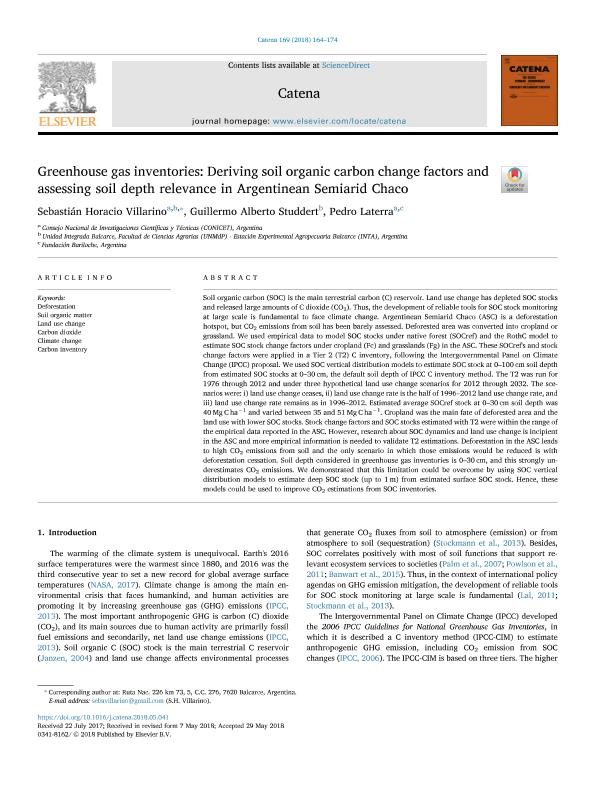Mostrar el registro sencillo del ítem
dc.contributor.author
Villarino, Sebastián Horacio

dc.contributor.author
Studdert, Guillermo Alberto

dc.contributor.author
Laterra, Pedro

dc.date.available
2019-09-17T18:24:40Z
dc.date.issued
2018-06-02
dc.identifier.citation
Villarino, Sebastián Horacio; Studdert, Guillermo Alberto; Laterra, Pedro; Greenhouse gas inventories: Deriving soil organic carbon change factors and assessing soil depth relevance in Argentinean Semiarid Chaco; Elsevier Science; Catena; 169; 2-6-2018; 164-174
dc.identifier.issn
0341-8162
dc.identifier.uri
http://hdl.handle.net/11336/83723
dc.description.abstract
Soil organic carbon (SOC) is the main terrestrial carbon (C) reservoir. Land use change has depleted SOC stocks and released large amounts of C dioxide (CO2). Thus, the development of reliable tools for SOC stock monitoring at large scale is fundamental to face climate change. Argentinean Semiarid Chaco (ASC) is a deforestation hotspot, but CO2 emissions from soil has been barely assessed. Deforested area was converted into cropland or grassland. We used empirical data to model SOC stocks under native forest (SOCref) and the RothC model to estimate SOC stock change factors under cropland (Fc) and grasslands (Fg) in the ASC. These SOCref´s and stock change factors were applied in a Tier 2 (T2) C inventory, following the Intergovernmental Panel on Climate Change (IPCC) proposal. We used SOC vertical distribution models to estimate SOC stock at 0–100 cm soil depth from estimated SOC stocks at 0–30 cm, the default soil depth of IPCC C inventory method. The T2 was run for 1976 through 2012 and under three hypothetical land use change scenarios for 2012 through 2032. The scenarios were: i) land use change ceases, ii) land use change rate is the half of 1996–2012 land use change rate, and iii) land use change rate remains as in 1996–2012. Estimated average SOCref stock at 0–30 cm soil depth was 40 Mg C ha−1 and varied between 35 and 51 Mg C ha−1. Cropland was the main fate of deforested area and the land use with lower SOC stocks. Stock change factors and SOC stocks estimated with T2 were within the range of the empirical data reported in the ASC. However, research about SOC dynamics and land use change is incipient in the ASC and more empirical information is needed to validate T2 estimations. Deforestation in the ASC leads to high CO2 emissions from soil and the only scenario in which those emissions would be reduced is with deforestation cessation. Soil depth considered in greenhouse gas inventories is 0–30 cm, and this strongly underestimates CO2 emissions. We demonstrated that this limitation could be overcome by using SOC vertical distribution models to estimate deep SOC stock (up to 1 m) from estimated surface SOC stock. Hence, these models could be used to improve CO2 estimations from SOC inventories.
dc.format
application/pdf
dc.language.iso
eng
dc.publisher
Elsevier Science

dc.rights
info:eu-repo/semantics/openAccess
dc.rights.uri
https://creativecommons.org/licenses/by-nc-sa/2.5/ar/
dc.subject
Carbon Dioxide
dc.subject
Carbon Inventory
dc.subject
Climate Change
dc.subject
Deforestation
dc.subject
Land Use Change
dc.subject
Soil Organic Matter
dc.subject.classification
Ciencias del Suelo

dc.subject.classification
Agricultura, Silvicultura y Pesca

dc.subject.classification
CIENCIAS AGRÍCOLAS

dc.title
Greenhouse gas inventories: Deriving soil organic carbon change factors and assessing soil depth relevance in Argentinean Semiarid Chaco
dc.type
info:eu-repo/semantics/article
dc.type
info:ar-repo/semantics/artículo
dc.type
info:eu-repo/semantics/publishedVersion
dc.date.updated
2019-09-05T15:29:10Z
dc.journal.volume
169
dc.journal.pagination
164-174
dc.journal.pais
Países Bajos

dc.journal.ciudad
Amsterdam
dc.description.fil
Fil: Villarino, Sebastián Horacio. Consejo Nacional de Investigaciones Científicas y Técnicas. Centro Científico Tecnológico Conicet - Mar del Plata; Argentina. Universidad Nacional de Mar del Plata. Facultad de Ciencias Agrarias; Argentina. Instituto Nacional de Tecnología Agropecuaria. Centro Regional Buenos Aires Sur. Estación Experimental Agropecuaria Balcarce; Argentina
dc.description.fil
Fil: Studdert, Guillermo Alberto. Universidad Nacional de Mar del Plata. Facultad de Ciencias Agrarias; Argentina. Instituto Nacional de Tecnología Agropecuaria. Centro Regional Buenos Aires Sur. Estación Experimental Agropecuaria Balcarce; Argentina
dc.description.fil
Fil: Laterra, Pedro. Consejo Nacional de Investigaciones Científicas y Técnicas. Centro Científico Tecnológico Conicet - Patagonia Norte; Argentina. Fundación Bariloche; Argentina
dc.journal.title
Catena

dc.relation.alternativeid
info:eu-repo/semantics/altIdentifier/url/https://www.sciencedirect.com/science/article/pii/S0341816218302145
dc.relation.alternativeid
info:eu-repo/semantics/altIdentifier/doi/http://dx.doi.org/10.1016/j.catena.2018.05.041
Archivos asociados
